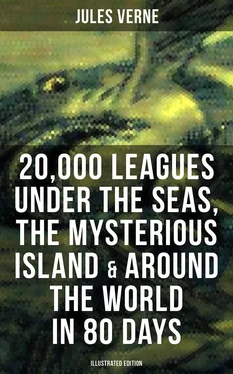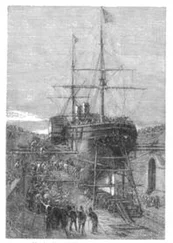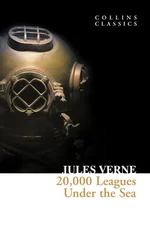“Yes, we are … certainly … ,” I replied evasively, “but after we make a detour.”
“Whatever detour master wishes.”
“Oh, it’s nothing really! A route slightly less direct, that’s all. We’re leaving on the Abraham Lincoln.”
“As master thinks best,” Conseil replied placidly.
“You see, my friend, it’s an issue of the monster, the notorious narwhale. We’re going to rid the seas of it! The author of a two-volume work, in quarto, on The Mysteries of the Great Ocean Depths has no excuse for not setting sail with Commander Farragut. It’s a glorious mission but also a dangerous one! We don’t know where it will take us! These beasts can be quite unpredictable! But we’re going just the same! We have a commander who’s game for anything!”
“What master does, I’ll do,” Conseil replied.
“But think it over, because I don’t want to hide anything from you. This is one of those voyages from which people don’t always come back!”
“As master wishes.”
A quarter of an hour later, our trunks were ready. Conseil did them in a flash, and I was sure the lad hadn’t missed a thing, because he classified shirts and suits as expertly as birds and mammals.
The hotel elevator dropped us off in the main vestibule on the mezzanine. I went down a short stair leading to the ground floor. I settled my bill at that huge counter that was always under siege by a considerable crowd. I left instructions for shipping my containers of stuffed animals and dried plants to Paris, France. I opened a line of credit sufficient to cover the babirusa and, Conseil at my heels, I jumped into a carriage.
For a fare of twenty francs, the vehicle went down Broadway to Union Square, took Fourth Ave. to its junction with Bowery St., turned into Katrin St. and halted at Pier 34. There the Katrin ferry transferred men, horses, and carriage to Brooklyn, that great New York annex located on the left bank of the East River, and in a few minutes we arrived at the wharf next to which the Abraham Lincoln was vomiting torrents of black smoke from its two funnels.
Our baggage was immediately carried to the deck of the frigate. I rushed aboard. I asked for Commander Farragut. One of the sailors led me to the afterdeck, where I stood in the presence of a smart-looking officer who extended his hand to me.
“Professor Pierre Aronnax?” he said to me.
“The same,” I replied. “Commander Farragut?”
“In person. Welcome aboard, professor. Your cabin is waiting for you.”
I bowed, and letting the commander attend to getting under way, I was taken to the cabin that had been set aside for me.
The Abraham Lincoln had been perfectly chosen and fitted out for its new assignment. It was a high-speed frigate furnished with superheating equipment that allowed the tension of its steam to build to seven atmospheres. Under this pressure the Abraham Lincoln reached an average speed of 18.3 miles per hour, a considerable speed but still not enough to cope with our gigantic cetacean.
The frigate’s interior accommodations complemented its nautical virtues. I was well satisfied with my cabin, which was located in the stern and opened into the officers’ mess.
“We’ll be quite comfortable here,” I told Conseil.
“With all due respect to master,” Conseil replied, “as comfortable as a hermit crab inside the shell of a whelk.”
I left Conseil to the proper stowing of our luggage and climbed on deck to watch the preparations for getting under way.
Just then Commander Farragut was giving orders to cast off the last moorings holding the Abraham Lincoln to its Brooklyn pier. And so if I’d been delayed by a quarter of an hour or even less, the frigate would have gone without me, and I would have missed out on this unearthly, extraordinary, and inconceivable expedition, whose true story might well meet with some skepticism.
But Commander Farragut didn’t want to waste a single day, or even a single hour, in making for those seas where the animal had just been sighted. He summoned his engineer.
“Are we up to pressure?” he asked the man.
“Aye, sir,” the engineer replied.
“Go ahead, then!” Commander Farragut called.
At this order, which was relayed to the engine by means of a compressed-air device, the mechanics activated the start-up wheel. Steam rushed whistling into the gaping valves. Long horizontal pistons groaned and pushed the tie rods of the drive shaft. The blades of the propeller churned the waves with increasing speed, and the Abraham Lincoln moved out majestically amid a spectator-laden escort of some 100 ferries and tenders.*
*Author’s Note: Tenders are small steamboats that assist the big liners.
The wharves of Brooklyn, and every part of New York bordering the East River, were crowded with curiosity seekers. Departing from 500,000 throats, three cheers burst forth in succession. Thousands of handkerchiefs were waving above these tightly packed masses, hailing the Abraham
Lincoln until it reached the waters of the Hudson River, at the tip of the long peninsula that forms New York City.
The frigate then went along the New Jersey coast—the wonderful right bank of this river, all loaded down with country homes— and passed by the forts to salutes from their biggest cannons. The Abraham Lincoln replied by three times lowering and hoisting the American flag, whose thirty-nine stars gleamed from the gaff of the mizzen sail; then, changing speed to take the buoy-marked channel that curved into the inner bay formed by the spit of Sandy Hook, it hugged this sand-covered strip of land where thousands of spectators acclaimed us one more time.
The escort of boats and tenders still followed the frigate and only left us when we came abreast of the lightship, whose two signal lights mark the entrance of the narrows to Upper New York Bay.
Three o’clock then sounded. The harbor pilot went down into his dinghy and rejoined a little schooner waiting for him to leeward. The furnaces were stoked; the propeller churned the waves more swiftly; the frigate skirted the flat, yellow coast of Long Island; and at eight o’clock in the evening, after the lights of Fire Island had vanished into the northwest, we ran at full steam onto the dark waters of the Atlantic.
Table of Contents
COMMANDER FARRAGUT was a good seaman, worthy of the frigate he commanded. His ship and he were one. He was its very soul. On the cetacean question no doubts arose in his mind, and he didn’t allow the animal’s existence to be disputed aboard his vessel. He believed in it as certain pious women believe in the leviathan from the Book of Job—out of faith, not reason. The monster existed, and he had vowed to rid the seas of it. The man was a sort of Knight of Rhodes, a latter-day Sir Dieudonné of Gozo, on his way to fight an encounter with the dragon devastating the island. Either Commander Farragut would slay the narwhale, or the narwhale would slay Commander Farragut. No middle of the road for these two.
The ship’s officers shared the views of their leader. They could be heard chatting, discussing, arguing, calculating the different chances of an encounter, and observing the vast expanse of the ocean. Voluntary watches from the crosstrees of the topgallant sail were self-imposed by more than one who would have cursed such toil under any other circumstances. As often as the sun swept over its daily arc, the masts were populated with sailors whose feet itched and couldn’t hold still on the planking of the deck below! And the Abraham Lincoln’s stempost hadn’t even cut the suspected waters of the Pacific.
As for the crew, they only wanted to encounter the unicorn, harpoon it, haul it on board, and carve it up. They surveyed the sea with scrupulous care. Besides, Commander Farragut had mentioned that a certain sum of $2,000.00 was waiting for the man who first sighted the animal, be he cabin boy or sailor, mate or officer. I’ll let the reader decide whether eyes got proper exercise aboard the Abraham Lincoln.
Читать дальше












